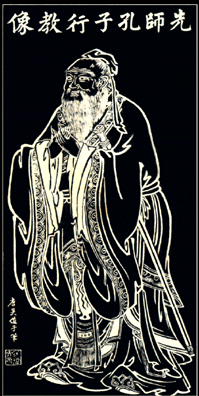 Confucius laid down a pattern of thinking followed by more people for more generations than any other human being on the face of the earth. No matter what religion, no matter what form of government, the Chinese (and most other East Asian civilizations) and their way of thinking can in some way be shown to have Confucian elements about them. But Confucius was no religious leader nor did he claim any special divine status (nor was any divine status claimed for him). He was, in fact, a relatively ordinary person; his family was from the lesser aristocracy that had fallen on extremely hard times when he was born in 551 B.C. in the province of Lu. He was born into the family of K'ung and was given the name Ch'iu; in later life he was called "Master Kung": K'ung Fu-tzu, from which the Latin form, Confucius, is derived. He began a startlingly successful early political career as a young man, rising quickly in the administrative ranks, but fell out of favor fast. Although his intense personal goal was to restore peace and orderliness to the province, he found himself dismissed from government early on. He never returned to public life. Instead he turned to teaching, hoping that he could change the world by changing its leaders at a young age. We have many accounts of his teaching and all his students praise his natural talent for brilliant teaching. These students recorded these teachings and this is what comes down to us as the Analects. The Confucian method characterizes just about all Chinese learning down to the present day; its fundamental tenet is the unwavering belief in the perfectibility of human beings through learning. Confucius laid down a pattern of thinking followed by more people for more generations than any other human being on the face of the earth. No matter what religion, no matter what form of government, the Chinese (and most other East Asian civilizations) and their way of thinking can in some way be shown to have Confucian elements about them. But Confucius was no religious leader nor did he claim any special divine status (nor was any divine status claimed for him). He was, in fact, a relatively ordinary person; his family was from the lesser aristocracy that had fallen on extremely hard times when he was born in 551 B.C. in the province of Lu. He was born into the family of K'ung and was given the name Ch'iu; in later life he was called "Master Kung": K'ung Fu-tzu, from which the Latin form, Confucius, is derived. He began a startlingly successful early political career as a young man, rising quickly in the administrative ranks, but fell out of favor fast. Although his intense personal goal was to restore peace and orderliness to the province, he found himself dismissed from government early on. He never returned to public life. Instead he turned to teaching, hoping that he could change the world by changing its leaders at a young age. We have many accounts of his teaching and all his students praise his natural talent for brilliant teaching. These students recorded these teachings and this is what comes down to us as the Analects. The Confucian method characterizes just about all Chinese learning down to the present day; its fundamental tenet is the unwavering belief in the perfectibility of human beings through learning.
The text of "The Chapter of Great Harmony" is as the following
When the Great Principle prevails, the world is a Commonwealth in which rulers are selected according to their wisdom and ability. Mutual confidence is promoted and good neighborliness cultivated. Hence, men do not regard as parents only their own parents, nor do they treat as children only their own children. Provision is secured for the aged till death, employment for the able-bodied, and the mean of growing up for the young. Helpless widows and widowers, orphans and the lonely, as well as the sick and the disable, are well cared for. Men have their respective occupations and women their homes. They do not like to see wealth lying idle, yet they do not keep it for their own gratification. They despise indolence, yet they do not use their energies for energies for their own benefit. In this way, selfish scheming are repressed, and robbers, thieves and other lawless men no longer exist, and there is no need for people to shut their outers. This is called the Great Harmony (DA TUNG). | |